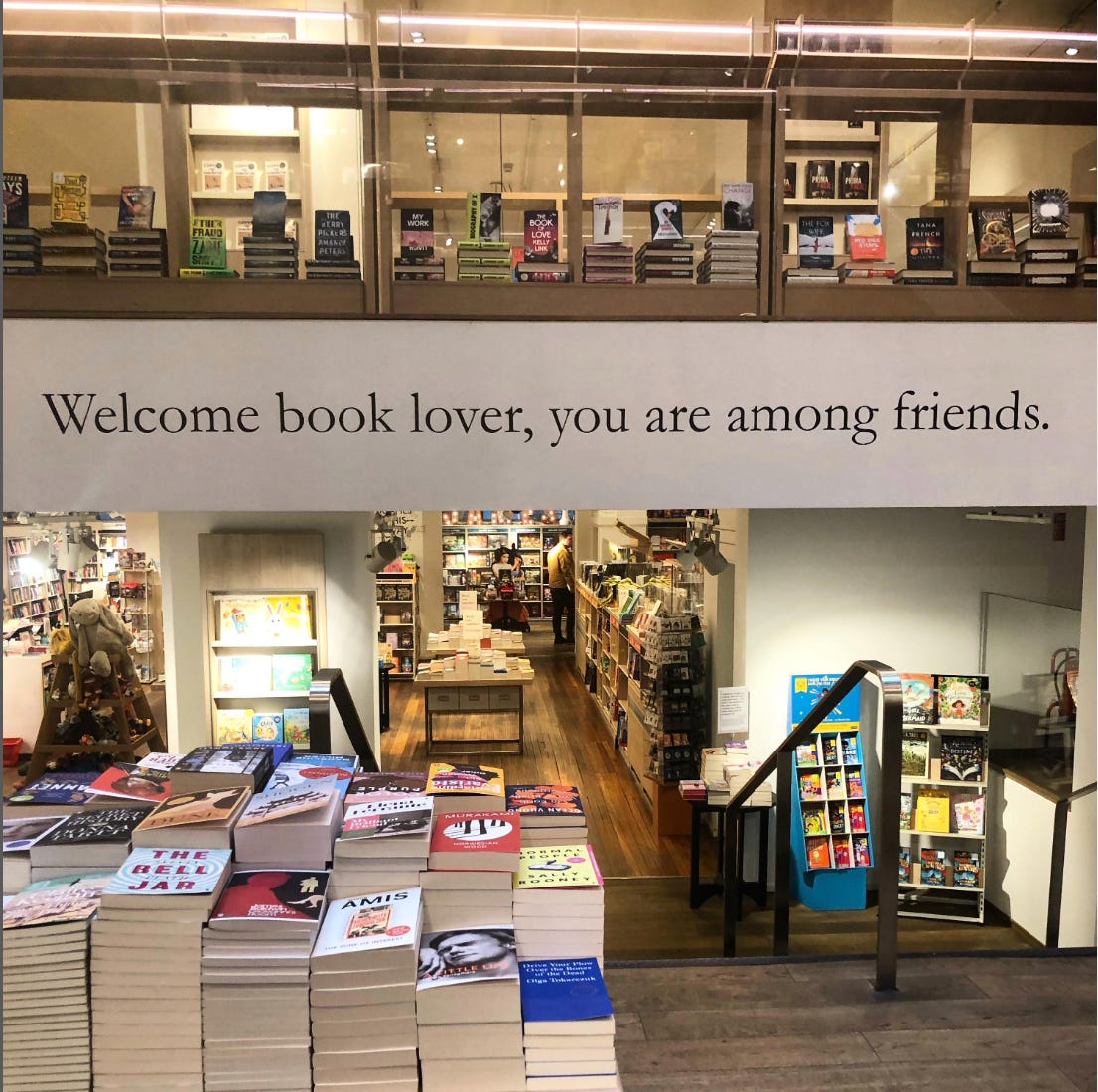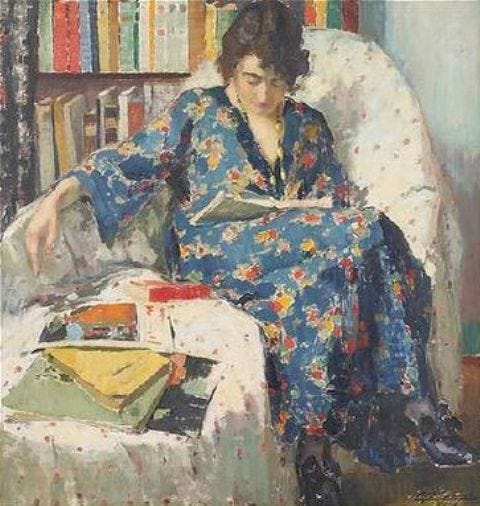This London bookshop speaks my language.
Friends, today a special invitation as part of my ongoing birthday celebrations (let us not forget, it’s a birthday year, not just a day). Many of you know that I host a literary fellowship over at Patreon called The Book Girl Fellowship. I give two talks a month on a lively assortment of the books I’m loving, finding, works with which I’m wrestling, stories in which I’m delighting. We wend our way through picture books and classic novels, contemporary fiction and theological tomes: we liven the world through words. I treasure this group of engaged and thoughtful readers.
The membership is a paid one, and I’m profoundly grateful for the very needed support for my family I gain through that work. But in honour of my birthday, I’m making this week’s episode free to everyone. Thus, the video in this post!
I’m exploring and reading aloud from a number of the landmark books of my past forty years. There are so many lists I could have named (favourite novels, best works of theodicy, books from each decade of my life… episodes are forming in my mind as we go), but I decided to explore the books that actually shaped or even changed my story. These were companion books, works that confronted or comforted me, kindled or startled me in such a way that my life looks profoundly different for it.
Elanor, my 8-month-old, decided to unexpectedly join us. I planned to record on an evening I expected to be entirely calm, and as things go, it was entirely not. But there we are. If there's one thing I believe about the reading life and want to help others discover as well, it's that reading isn't a specialist activity; it's a life. A story. A way of existing amidst whatever beauty or uproar attends your days.
So join me (and Elanor) for a special exploration of these lovely, potent, formative landmark books. You actually get five bonus books in the list below (along with short descriptions) as I managed to sit on a small stack that I intended to include in the video. You may laugh.
Welcome book lovers. You are definitely among many wondrous friends here at the BGF. I hope you enjoy the episode.
My landmark books (in loose chronological order):
The Genesis Trilogy by Madeleine L’Engle
I read this in the first blush of my faith crisis in the wake of an OCD diagnosis. The world as I knew it, crumbled. My faith ‘stretched and strained in the darkness’, and L’Engle, ah, she believed and described God as good and the world as luminous with his love. I need that restoration.The Lord of the Rings Trilogy by J.R.R. Tolkien
You all know this. LOTR saved my faith, it helped me grasp the narrative quality of existence and understand the agency I still possessed, even amidst suffering. Defiant beauty, despair refused, faithful choice as the crux of epics… it’s what I needed to in order to fully believe.Gentian Hill by Elizabeth Goudge
My first Goudge, and ah, to read it was a little like falling in love and coming home. I recognised the tenor of her world - one in which every aspect of the ordinary bore a music and meaning that made existence a ceaseless journey into mystery - because it was the one that dwelt as the inmost gem of my imagination. Her gift to me was the capacity to trust that this vision was true, and was one I could bear into my own most mundane moments.The Scent of Water by Elizabeth Goudge
This novel is the best book I’ve ever read about OCD. I tend to interpret my experience by story, so workbooks and science guides did little for me in the larger work of living with a broken mind. But this book, centred on a character whose work is to learn to bear her madness, the anguished frailty of her mind, allowed me to progress, not just in the sheer motion of coping, but the formed action of assent, of trust, of hope.The Celtic Way of Prayer by Esther De Waal
My first taste of corporate, liturgical prayer, of standing int he company of generations of saints as I whispered my prayers each morning, a companionship I’d craved, a discipline I now embrace as a central form to my life.The Life You Save May Be Your Own by Paul Elie
I listened to this on audiobook during a roadtrip I’d started in sheer despair. I didn’t know what to do with my life, with my broken mind, my panick-attacked emotions, my recalcitrant body unable to live the normal life I desired, so I drove. From state to state, from friend to friend, in search of some crumb to help me imagine my future. And in came Paul Elie, telling the stories of four great Catholic writers… two of whom (Flannery O’Connor and Thomas Merton, whom I loved) lived physically cloistered, local, limited lives. And yet, by writing, by the grace and magic of words in their power to transcend all boundaries, they reached the world. In listening to this book, I could imagine such grace for myself.Surprised by Joy by C.S. Lewis
The first book I read for my first C.S. Lewis tutorial in Oxford. Lewis describes his experiences of ‘joy’ as central to his conversion. What he described as joy I described as the ‘knowings’ I found in moments of beauty. Reading his account of coming to trust what that joy told him as true (in the language of imagination, rather than reason) allowed me a freedom to trust my own moments of beauty that broadened and enflamed my faith.Faith, Hope, and Poetry by Malcolm Guite
A brilliant defense of the imagination and of poetry, and narrative as integral to the way we describe, experience, and imagine God’s reality. Reading this gave me a whole new scope for what research could mean, and what a life of study could reveal.
The Art of the Commonplace by Wendell Berry
The first time I read this, I found myself feeling that someone had finally put words to the vague discomforts and disgruntlements of my soul with the many foibles of modern life. Essays like ‘Health is Membership’ allowed me to articulate for myself why we must resist the impersonal forces of a technologised world and contend for community, local knowledge, incarnational attention, and home-making, place-keeping, as a form of the Love ‘that holds and cherishes all the world’ (as Berry’s fictional character Hannah Coulter puts it in the novel that shares her name).
Middlemarch by George Eliot
First, the heroine Dorothea is described as a modern day Saint Teresa with no place to spend her fiery devotion. I understood this. I wanted ultimates, sacrifice, academic honour, writerly prestige, and when I read this first, none of it was really imaginable. But this, this is a novel of what it means to live a ‘hidden life’. If you want my full opinion, read my article at Plough.Remembering by Wendell Berry
Perhaps my favourite theodical novel, a story that follows the interior journey of a character whose vision of the world is broken by suffering… and restored by those who kept faith, home, and joy in his absence, who hold him even though ‘he does not hold’.Heavenly Participation by Hans Boersma
My introduction to sacramental theology. Whe I showed up at the door of my Anglican priest my first year in Oxford, with a double sided piece of paper with all my questions about Eucharist, sacrament, liturgy, and ritual, he sat me down the Bible, the Book of Common Prayer, and this work. Ya’ll. I’m the wife of an Anglo Catholic vicar. You bet it changed my life.Lila by Marilynne Robinson
A great theodical novel, in my opinion, a superbly woven story that evokes a life of profound suffering and what it looks like (from inside) to move so gradually from suspicion to trust, from disintegration to love.The Doors of the Sea by David Bentley Hart
Though not explicitly a work of theology, this mediation by a great theologian on the problem of evil, the problem of suffering, is one of my favourite works of theodicy. Informed by literature and poetry, by a deep sense of God’s answer to a suffering world in the person of Christ, it helped me to imagine what I wanted to say about my own brokenness. and how beauty answered and transformed it.The Collected Poems of Denise Levertov ed. by Paul A. Lacey
Levertov helped rekindle my love for poetry. She quickens my love for God, my startled awe at his goodness. And asks me to be a better writer. Ah, her words.Pilgrim at Tinker Creek by Annie Dillard
Some books ask something of you even as they comfort and kindle every aspect of mind and imagination. This book asked sharpened daily sight of me, intensive engagement with the minuscule miracle of my daily world, and good, good writing. She
And just for bonus, I should mention a book I’ve just started that I think will be a landmark book in my life, and may just have inspired the title of this episode: Landmarks by Robert MacFarlane. But I’ll keep my thoughts to myself… for now.
Read on, good souls, read on, every word a step on the road to illumined joy.








My Landmark Books: A 40th Birthday Review